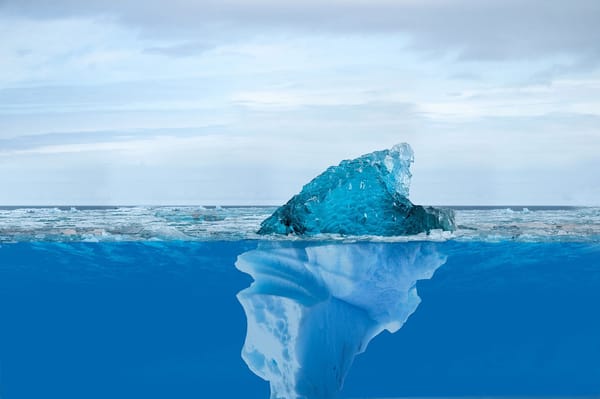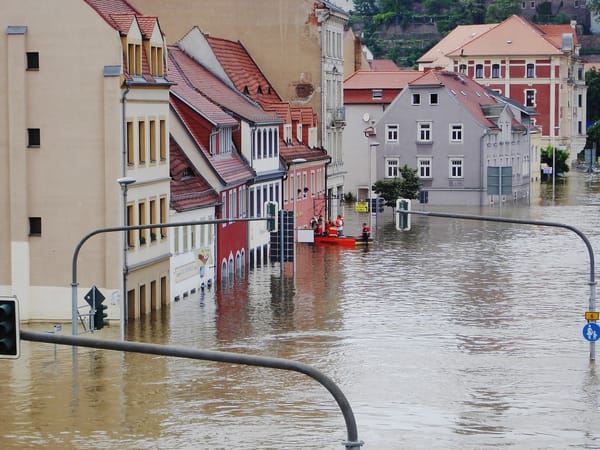The Safest Countries and Places to Live During Climate Change
Migration and relocation will change the lives of many during the next ten years.


It's the earliest adopters who generally win the prize, and that will be true who consider the strengths and weaknesses of their geographical area now.
I have a friend who lives in Mexico. She has been speaking about moving to a cooler place for the past year - the heat is unbearable, she says. I can sympathize with that. When I lived in Andalusia (Spain), the constant temperature was 108°F degrees. It taught me that too much heat is debilitating. Apart from that, the kidneys don't function very well in that heat, and it can cause death.
We have demonstrated that kidney injury risk is increased when men are exposed over an eight-hour period to a wet bulb temperature of 88°C and exacerbated at a wet bulb temperature of 34°C. Importantly, these heat stress conditions parallel those that are encountered during current (87.8°F) and future (93.2°F) extreme heat events. The kidney injury biomarker analyses indicate both the proximal and distal tubules as the locations of potential renal injury and that the injury is likely due to oxidative stress and inflammation. National Library of Medicine
Apart from that, as floods and fires in cities, towns, and the countryside become more prevalent, there will be an influx of migrants. Consequently, housing will become more scarce, prices will increase, and as some cannot be accommodated, and they will be fighting for their own survival, crime will increase.
The trick is to be aware of this before it happens, then look at either how to protect one's own abode, or to relocate to another area where the effects of climate change are less likely.
Criteria for safe places during climate change
It's difficult to wade through all the opinions and bits of research about which areas (countries) will be safest. For instance, it has repeatedly been said that Africa will have the greatest damage of climate change. The reason for this (as I have frequently read) is not that climate change will attack Africa more badly, but that Africa does not have the resources to deal with it.
I think that is short term thinking.
That may certainly be true in the short term, but in the longer term, countries will go bankrupt, and the electricity grid will eventually fall into a state of disrepair. Once the electricity grid goes, our modern civilization fails.
Others seem to think that islands will be the best place to live (the UK, Ireland, New Zealand, etc.) because the sea will prevent migration to them. Thus, these countries will not face the risks that excessive climate change refugee brings.
Still others consider the those countries where there is a lot of green energy to keep the electricity grid going, and where there is sufficient fertile land to grow food and raise livestock. My issue with this measurement is that green energy requires batteries, and batteries require rare earths in order to run. If the countries that mine rare earths are no longer functioning, and the factories that produce the batteries are gone, of what use is green technology? It's not so green, anyway.
There is also the idea that those countries with the most resources will be best able to survive climate change. Below are examples of three different lists.



I'm sure, if you're interested in this topic, you will have read some of these lists. That said, let me give you some of the shoddy reasoning behind too many of these lists.
I'm currently living in Ireland, so I'm going to take Ireland for my first example. In some lists, it is in the top five. In this particular list, it's number eleven. (In yet another list, it's number thirty-seven.)
Ireland’s main advantage to climate disasters rests in its independence from agriculture. Though the greenery in Ireland is exceptional, the country does not mainly rely on agriculture, saving it from climatic destructions. According to Environmental Protection Agency, the Irish government is committed to reducing around 7% of its greenhouse gas emissions per year to reach the main goal by 2030. It also aims to achieve zero net emissions by 2050. Moreover, Ireland has abundant sources of renewable energy, including wind and tidal. The wind has been the main source of renewable energy, and the London-listed company SSE Renewable (LON: SSE) plans to spend over €6bn to build offshore wind farms around the Irish coast. Ireland ranks 39th on CCPI. Ireland ranks 11th in the list of best countries to live considering climate change. Source
The particular nitwits who composed this list seem to think that without agriculture, the country will be safe. Ireland imports much of it's food. For instance, there was a problem when Ukraine found itself in Russia's headlights. Most of the flour in Ireland came from Ukraine.
Ireland comprises mostly grass - not woodlands or rainforests. The grass is for feeding cattle and sheep. It exports meat to the EU. So, to me, I look ten years down the road, when food shortages will have become quite routine, and I wonder where Ireland is going to import its food from. Surely, a country that is 'safer' should be able to provide its own food.
Best ranked countries amongst multiple lists for Climate Change
I had to go through numerous lists, put them on an excel sheet, and then read up why they were considered the top countries. Then I had to look at why there was so much discrepancy about the United States. The only area that comes up (in one list) is that Alaska and the land around the Great Lakes will be the areas to survive climate change.
However, while escaping the heat to live in the north is most definitely an option, little thought has been given to melting ice caps and snow which will result in floods (until all the ice is melted anyway).
When you check to see which countries are agreed on by all the different studies, this is what emerges.
- United Kingdom - with Scotland being the safest place to be. All six studies agree.
- Iceland has five different studies putting it in the top ten.
- Norway, Sweden, and New Zealand come in with four studies placing those countries in the top ten.
- Finland, Denmark, and Ireland are selected by three studies out of the six studies compared.
In order for you to be able to both check my figures, plus gain further information, here are the links to the information that I compared.
ND-Gain, Notre Dame Global Adaptation Initiative
Anglia Ruskin University, UK
Climate Change Performance Index
Time Magazine
Global Sustainability Trust
Eco Experts
Some surprises about the safety of various countries 'during climate change
Despite some rankings based on the ability of the country to 'eix up' any damage caused by climate change, the United States is ranked number 52. That is not good news.
The countries worst affected in terms of weather events are not well developed countries. They are:
South Sudan is warming up more rapidly than any other country in the world. Madagascar, a rather large island on the east coast of southern Africa has been beset cyclones, droughts, and floods. Pakistan is under water - a third of it. The Sahel, which is the area underneath the Sahara, is facing a large number of floods, droughts, and fires. In South America, El Salvador, Honduras, and Guatemala can no longer grow sufficient food to provide for everybody in the country (Nor can the UK, but for reasons of over-population).
The effects of climate change are not evenly distributed.
Therefore, in order to be more safe, rather than less safe, I would make the following into consideration when selecting a place to live for the rest of your life.
- If your area is not yet experiencing excessive heat, you are probably safer than most. Climate change is progressing faster than expected, so if you're already excessively hot, consider moving to a cooler climate - either higher up or further north. In the south, only Argentina can be considered.
- Consider the financial resources of the country as well as its willingness to expend money on fortifying buildings, relocating people to safer areas, providing emergency care, and looking at alternative energy supplies.
- Consider that the next ten years will make a big difference to those who survive. Adaptation will be slow - this is human nature. However, the people (and countries) that survive the next ten years, have a good chance of surviving another ten, and so on, and so forth.
- Most will not be able to move to another country. In that case, it's important to look at the geographical areas of your own country. For instance, in the US, the areas around the Great Lakes and Alaska will be more able to survive. In the United Kingdom, Scotland will be better placed to survive. I also noted that there are various factors that are not yet available for public consumption. I was curious why Ireland was not (yet) receiving the extreme hot weather of Europe this past summer. Instead, we never had a summer. Apparently, when Europe gets high pressure (heat), Ireland gets low pressure (cold). The best people to speak to will be a meteorologist in your area.
- There will be increasing crime and desperation (have some compassion), so while big cities will have many more resources, it is probably better to think about living in a tightly woven community. If you don't have one, perhaps it's time to put out feelers. Relocating to a place where there is more community spirit might be a good thing. This is not something we are going to survive on our own. We will need each other.
- For the next ten or so years, the area you live in should have a good source of green energy. (Batteries last about ten years.) It should have a river or a lake nearby (for future water shortages), but you should live on top of a hill (in case of floods). Consider safety precautions like tin roofs (which are better able to protect your house against approaching fire) and a stable economy. Also, avoid areas which have strong religious communities as they are likely to blame climate change on short skirts and contraception. You need accurate data to survive this, so if there is a nearby university which a good research department, it's a bonus.
- If there is nothing you can do (too poor), be ready at the first sign of an approaching fire, hurricane, or flood. Listen carefully to the world around you, and have a plan and a to-go bag ready packed. It will be too late to shop for the items when the event has arrived - even if you have a few day's warning. Everybody else is going to be looking for the same thing. Your to-go bag should contain things like a small waterproof, heat reflective tent, flashlight, matches, food, water, first-aid kit, charger and power-bank for your phone, ID and passport documentation, dust or disease mask, map, money, and a change of clothing. Also, be sure to have a check-in plan with family, friends, and community. It is not too early to plan.

Climate change preparation
Climate change is now with us. I'm of the opinion that we have passed the time where we could have averted it. Now we are going to live with it. I think it's possible to still save some of our civilisation, using high tech and careful preparation. I also don't think that this will come from government. I think we've reached a point where we are going to have to work with like-minded people in order to save ourselves.

I wish you well in your preparations. You may never need those preparations, but it's better to be well prepared in an unexpected emergency than losing one's life when the s**t hits the fanbelt. Just saying.






